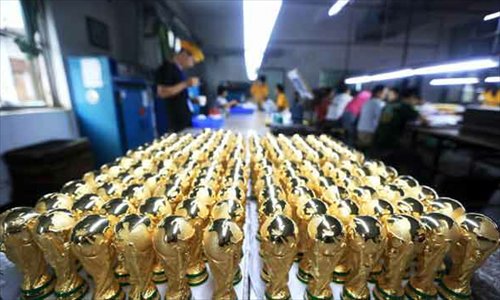Manufacturing 'Team China' scores at soccer showcase

China doesn’t have a squad playing in this year’s ongoing World Cup but another "Team China" is enjoying a shining moment thanks to soccer’s showcase in Brazil.Photo: CCTV.com

China doesn’t have a squad playing in this year’s ongoing World Cup but another "Team China" is enjoying a shining moment thanks to soccer’s showcase in Brazil.Photo: CCTV.com
China doesn't have a squad playing in this year's ongoing World Cup but another "Team China" is enjoying a shining moment thanks to soccer's showcase in Brazil. That team is busy making the souvenirs that many World Cup fans crave and it's also scored a goal for China's vastly improved manufacturing sector.
Wagon Giftware is based in China's southern industrial hub of Dongguan and it has been producing World Cup souvenirs since 1994. The company's best-selling product is a replica of the World Cup. Wagon Giftware started out as a contractor for officially authorized companies and it used to earn only a small slice of the profit.
"The ex-factory price of a World Cup replica was some 40 US dollars while the market price was around 180 dollars. That's more than four times the initial price." Li Zheyu, General Manager of Wagon giftware said.
The glaring price differential prompted Wagon Giftware to try and move up on the value chain. The company upgraded its manufacturing equipment and improved its production procedures as it looked to grab a share of the marketing. Wagon Giftware now holds FIFA marketing rights to the World Cup in 16 countries and regions and these days retailers have to obtain the company's permission to sell the popular World Cup replica.
"We introduced automation and a more efficient management system. But that's not all. We boosted out marketing capacity. That's the most successful step in our transformation." Li said.
The strategy has proven to be successful. That's as Wagon Giftware's profits are up three times from four years ago. The company has been such a success that the local government has rolled out support policies to encourage more local manufacturers to climb the value chain and boost their global competitiveness.